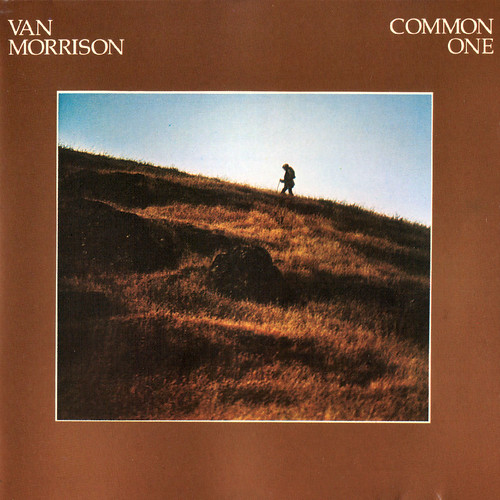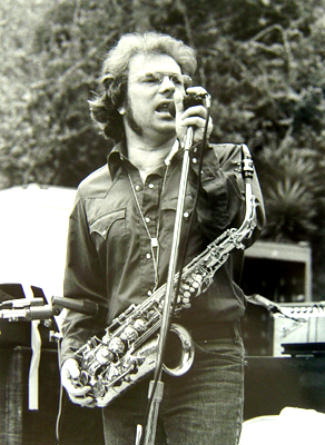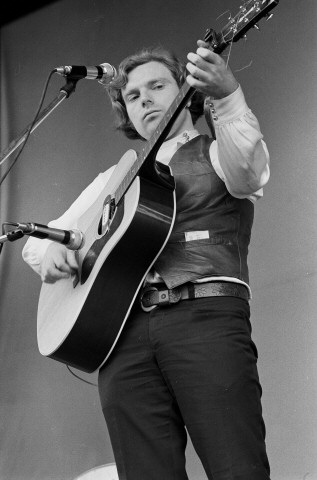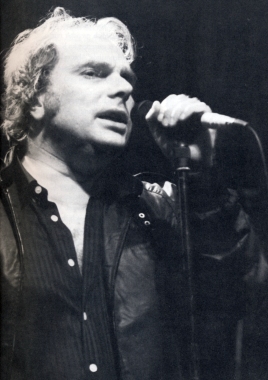Having been reinvigorated by the commercial and critical success of “Into the Music” a confident calculated Morrison made a daring and ultimately untimely decision to release another conceptual song cycle album in the style of Astral Weeks and Veedon Fleece this time with a free jazz influence delivered by Pee Wee Ellis on lead.
 Common One (1980)
Common One (1980)
Recorded in nine days and eight nights in a French Monastery “Common One” was the exact opposite of what everyone expected from Morrison following the release on “Into the Music” one year prior. A dense more indeterminable though ultimately optimistic record Morrison implemented a free jazz atmosphere and stream of consciousness approach to the recording session, even performing three songs without and discernable melody and two tracks exceeding 15 minutes in length. It’s his most stripped down and raw album in more then five years but unfortunately quite possibly his most misunderstood ever. The critics smashed Morrison for being self absorbed and apathetic, describing his lyrics (based on American\English naturalist poetry) as pompous and trivial. This scathing epithet forced the natural reclusive Morrison into a 18 month hiatus from recording and prompted him to vow never to make another album quite so daring, a promise he’s sadly kept to over the years…
1. Haunts of Ancient Peace – Heavy, mega-mellow introduction to the album. Slowly and carefully progressing from the first note on through, each line is delivered with an undulating rhythm an escalating urgency. Simple and pure to its jazz origins and the theme therein the album. The rolling saxophone of Pee Wee Ellis copy cats Morrison’s punchy delivery and eventually takes center stage with the stand out instrumental performance of the album. Returning to it’s origins on the way out Haunts finishes as strong and slight as it starts. A fantastically melodic song.
8.5\10
2. Summertime in England – An amalgamation of free improvisational jazz, a work in progress poem and a full and devoted musical congregation. Throw in some literary influence name dropping a few dynamite diversions from the base melody and you an unforgettable 15 minute marvel and the most critically under rated Morrison number of all-time. An absolute show stopper for Morrison played live in the 1980’s and on occasion since. The song is so delicate at moments and then overwhelmed with sound later. It changes, evolves, returns and all along the way finds phrases which serve as guides or reminders of the overall concept. This is Morrison fully engorged in his influences musically, lyrically and conceptually. “Common One” the album title and catch phrase de jour of the number seems a persona and one that Morrison takes upon himself. He explains his confidence (“don’t stroke me, call me the common one”), perseverance (“high in the art of suffering one”) and acceptance (it ain’t why it just is”) all while exploding into holy music of a higher musical power. Conviction right until the end as Morrison provides ominous finality with “can you feel the silence”
9.5\10
3. Satisfied – The sort of antithesis “Summertime in England” in terms of structure and delivery, “Satisfied” is a number that has gotten better with time for me. It’s a mellow, bouncy jazz jumper that would have been a hit within “Into the Music”. Morrison sort of melts into the music throughout the verse before delivery a rousing fervor of a chorus between Pee Wee Ellis instrumentals featuring Van on accompaniment a nice twist for the album. The best line of the song is without question “I’ve got my Karma from here right to New York” which is senseless but brilliant.
7.5\10
4. Wild Honey – An endearing easy love song. As comfortably poppy and cliché as could be within the context of “Common One”. The song has a distant but unrelenting energy that sort of taps you on the shoulder as not to disturb. Musically the piano and the saxophone are breathtaking; the bass and drums are tactically and technically sound with flashes of flair. The strings are a narrative dynamo humming behind the enchanted confident pleas. A song that is so effortless it’s almost unprecedented, if only because I must to criticize it’s a safe choice for Morrison and the band, still it’s hard to fault them for this one considering the results.
8.5\10
5. Spirit – This song is so good that I have a sort of Pavlovian response soliciting uncontrollable giddiness in anticipation of “Spirit” during the final notes of “Wild Honey”. Starting with a crawl as Morrison to and fros’ his way through the inspirational repetitive progressions along with the beat; both leaving room for the music to grow. Then an explosion confidently ensuring the eternity of spirit; the music and the man crescendo at once for the most powerful and memorable moment of the album, the “Spirit” chorus. Musically Played with a relatively unscripted rhythm designed to fade in and out and create a sort of wave for the listener to ride. The determined nature of the verse is so wonderfully orchestrated and best exemplified late in the song with “And you keep walking on” etc. As powerful a healing song as any since Astral Weeks; A subtle but definite Morrison classic.
9\10
6. When Heart is Open – The most experimental song on the album completely devoid of any musically structure. The Musicians cautiously react to one another and their own interpretations of the song. This is the low point of the album sadly as the song, while at times interesting (near poetic lyrical moments, mirroring the opening track at one point) and consistently relaxing has little or no appeal to most fringe or outside fans and leaves even the most ardent supporters somewhat jaded. Still there is some credit to be given for the effort, especially in lieu of the album on its entire merits.
6.5\10
…In the past decade plus several critics have begun to revisit Common One and have called for a new fate fro the album. Citing an album that was years ahead of its time and very misunderstood. It’s Morrison’s most personally spiritual opus from his early years, and ultimately holy music. Several critics scorned Morrison for turning to religion, misunderstanding his convictions not as faith in traditional beliefs but in the mysticism of the enchanting healing nature of his music as it pertained to his personal experiences and those who can relate. This is a healing album for those whom it speaks to. The album contains at least two classics and features one of the most dynamic and dominant performances from a guest musician as Pee Wee Ellis plays the Cagney to Morrison’s Lacey. An example of how easy it is to overlook something we don’t understand at first glance or first listen. Thank goodness for this album.
 Defining Track(s):
Defining Track(s): “Summertime in England” and “Spirit” and masterpieces of Improvisational Soul.
Line in my head: “Holy Magnet Give you attraction Yea, I was attracted to You”
Christagu’s Take: Sententious, torpid, abandoned by God, this six-song, fifty-five minute meander is Morrison's worst since Hard Nose the Highway--Astral Weeks fans even think so. He does have a direct line to certain souls, though, and they still hear him talkin'. As in fact do I, twice--on the only vaguely fast one, which goes "I'm satisfied/With my world," and on the truly nutball "Summer in England," which goes "Did you ever hear about/Wordsworth and Coleridge, baby?"
B-
Star rating: (1-5) (from my personal catalog)
****
How it made me feel today: (1-10):
8.5
Overall Ranking: TBD
“The world is too much with us; late and soon,
Getting and spending, we lay waste our powers:
Little we see in Nature that is ours;
We have given our hearts away, a sordid boon!”
William Wordsworth
“Resembles Life what once was held of Light,
Too ample in itself for human sight ?
An absolute Self--an element ungrounded--
All, that we see, all colours of all shade
By encroach of darkness made ?--
Is very life by consciousness unbounded ?
And all the thoughts, pains, joys of mortal breath,
A war-embrace of wrestling Life and Death ?”
Samuel Taylor Coleridge
Next up: Beautiful Vision- 1982

















 Linear Mode
Linear Mode
